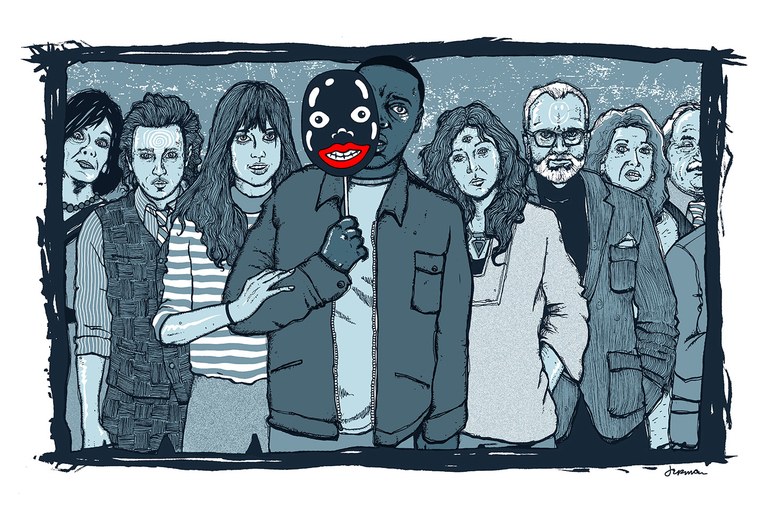While hypnotized by Rose’s mother, Missy Armitage, Chris is condemned to “The Sunken Place”. The Sunken Place is essentially a black hole of nothingness that strips Chris of his ability to control his body and allows him only to watch the life his body remains living as a passenger. As he is falling backwards aimlessly through the recesses of his mind, Chris experiences an out-of-body experience that represents the greater narrative of Black America. It is a theme that has been played out throughout American history – from slavery to the Tuskegee experiments all the way to present-day mass incarceration; the idea that terrifying and denigrating things come from white ownership of Black bodies. Chris is immobilized, powerless and vulnerable in the grips of Missy’s trance, which all originated from the lie that hypnosis would cure his nicotine addiction. From a big picture standpoint, there is a lot to be said for the fact that Chris is “sunken” anytime he entrusts his well being to the white people in this film.
The Sunken Place serves as a symbol for the systemic racism that “steals the agency” of Black Americans today. This systemic oppression of Black people has placed invisible chains on people where they cannot just dig their way out. We cannot dress, dance, talk our way out of it because it is bigger than all of us. And it is deep and all encompassing.
- The sunken place represents the helplessness and powerless feeling many Black Americans experience day-to-day, in a society controlled by whites where they are used for what they offer but never allowed to embrace who they truly are.
- The way in which statistics of failure (higher rates of incarceration, higher rates of poverty etc.) contribute to the feeling as though a future of failure is inevitable.
- Feelings of being a passenger in your own life: This speaks not only to the inevitability of failure as touched on above but also to the lack of influence of black communities on changing their situation. Or as put more, concisely by the director, Jordan Peele:
Or in the words of Daniel Kaluuya, who plays Chris, it can bebe read as a metaphor for the way black people are sometimes forced to resist reacting to what they see around them:
“Just feeling, that’s how being black sometimes feels like. You can’t actually say what you want to say because you may lose your job and you’re paralyzed in your life. You know? You’re paralyzed in your life, you want to express an emotion, and then it comes out in rage elsewhere, because you internalized it, because you can’t live your truth, and that’s what I’m trying to say is so amazing.” -Daniel Kaluuya
Or as referenced in this episode of Black-ish:
Thus, The Sunken Place becomes allegorical to to the actual paralyzing state of being when you are unable to defend yourself against racism in certain settings like the workplace. The hypnosis is a satirical/extreme example of the psychology associated with enduring racism of all kinds. One is aware that it is happening, but the need to keep one’s job, or not go to jail prevents them from being able to react. The mind of the actual black person in the film is trapped in ‘the sunken place’, and while they are aware, they are unable to react. Ultimately, this state of being becomes the suspended animation of how we look at race in America, a nation that has bound to the increasing belief that once Obama was elected President, the nation had overcome racism and had become “post-racial,” as mentioned at several instances throughout the film.

Georgina attempting to reassure Chris
The trope of The Sunken Place is unpacked in different ways in the film. The development of Georgina’s character is one that bears notable significance. She tried to stay woke from the depth of the darkness, and she gives a valiant fight. When the Armitages and Chris sit on their back deck, Georgina comes to pour them all iced tea but at one point, she zones out and spills tea around Chris’ glass. It was the first sign of the fact that she had some fight in her. In another scene, Georgina’s single tear and forced smile, exemplifying her suppressed emotions as a black person having to hide her pain and come off as strong and solid at all times, is indicative of the experiences of black individuals throughout all of American history. However, what is significant is her experience as a presumably queer black woman (who has had relations of some sort with Rose). Unlike Logan and Walter, who apparently needed a camera’s flash to “wake up,” Georgina was the only one whose black consciousness broke through without an external trigger. She is also depicted as seeming to have the greatest internal struggle when she was in close proximity to Chris, indicating that she was fighting the hardest but it was not even for herself (something that has been the case throughout black history in the relationship between black men and black women).
Georgina represents the characterization of how black women have often had to put up a valiant fight on behalf of the black family throughout American history. However, also importantly, it is evident in the film that Rose has been able to scheme up to a dozen black men, perhaps even more. The fact that Georgina is the only black woman that has been taken under the Armitages’ control perhaps embodies the notion that black women are more careful to not be lured into the sirens of white womanhood. Nevertheless, her capture itself still represents the fact that despite black women knowing better, the are still quite vulnerable. And the most vulnerable of black women, perhaps, is a queer black woman.
Connections to the Readings
Da Silva argues that political and social ideals are founded upon Western European imperialist ideals that rationality can be derived from one’s physical characteristics (race, ethnicity etc.). Get Out builds off da Silva highlighting the paralysis of The Sunken Place as a metaphor for the way political and social structures today are created on the basis of inequality and serve to essentially paralyze marginalized individuals from changing and achieving within the system. Hancock identifies the ways in which popular culture holds the power to influence society’s perception of itself and in profiting from reinforcing these defamatory stereotypes, popular culture influences society to view racial minorities negatively and two-dimensionally. In Get Out, Chris is only able to reach The Sunken Place after being repeatedly reminded of his shortcomings just as the amplification of negative statistics and stereotypes can result in a sense that failure is inevitable based on the amount of melanin you may possess.
In Elizabeth Bernstein’s “Carceral Politics as Gender Justice? The “Traffic in Women” and Neoliberal Circuits of Crime, Sex and Rights,” she discusses how state to use incarceration as an apparatus of control, removing those it deems threatening to society and reinforcing the patriarchal structures it thrives on. Additionally, Sune Sandbeck’s “Toward an Understanding of Carceral Feminism as Neoliberal Biopower” suggests that feminist advocacy moves away from relying on the threat of incarceration to address women’s issues since this feeds into the state’s use of prison as a method of control. The articles shed light on the authority of the state power to render blackness as the Other, who is denied protection but is often exploited by the state in order to generate surplus value.
In Treva Ellison’s “The Strangeness of Progress” and “The Disorder of Law and Order” Ellison draws on concepts of hierarchies of value and ethical outrage to develop their own framework of neoliberal multiculturalism, racial capitalism, and carceral geographies. The nation-state creates carceral geographies, which refer to the “formal institutions, processes and developments such as prisons and jails” (Ellison 326) and the knowledge and representational forms that are used to dominate and control, through racial capitalism and a mask of progress in order to further its own agenda. Based on difference, the nation-state creates a realm of relevance, in which those who belong are subjects of legal and ethical concern. At the state’s convenience, those who fall in the space of ethical absence are either protected or not protected. As disposable beings, these bodies are actively hurt when laws, such as Violent Crime Control and Law Enforcement Act, that promote mass incarceration are passed.


